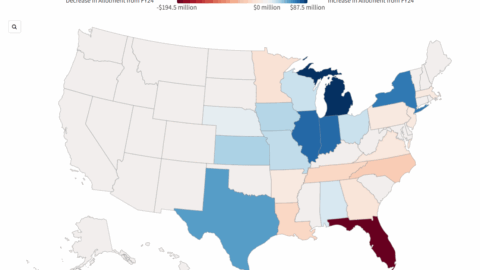Of foxes, henhouses and TSCA implementation: The chemical industry burrows into EPA’s toxics office
Richard Denison, Ph.D., is a Lead Senior Scientist.
The lead article in this past Sunday’s New York Times is titled “With Trump Appointees, a Raft of Potential Conflicts and ‘No Transparency’.” It features several prominent examples of recent political appointments of industry representatives and industry lobbyists to key policy positions where they are now charged with or involved in reviewing or crafting the very same agency regulations and policies that were the focus of their paid private sector work just prior to their appointments.
Add EPA’s implementation of the newly amended Toxic Substances Control Act (TSCA) to the list.
Dr. Nancy Beck has just been appointed Principal Deputy Assistant Administrator in the Office of Chemical Safety and Pollution Prevention (OCSPP) at the Environmental Protection Agency (EPA), and reportedly started in that position on Monday, April 17, 2017. Dr. Beck is moving into her new position at EPA directly from her job as Senior Director, Regulatory Science Policy, Division of Regulatory & Technical Affairs at the American Chemistry Council (ACC), a position she has held since January, 2012. ACC is the main trade association for the chemicals industry, with a membership of more than 150 chemical companies, including such behemoths as BASF, Dow, DuPont and ExxonMobil.
In her new job, Dr. Beck is expected to play a key role in implementing the new reforms made to TSCA, including in critical decisions that EPA will be making literally any day now, many of them driven by firm statutory deadlines. These decisions will directly affect the financial interests of the companies represented by ACC. And they will involve deciding whether or not the agency should take positions for which Dr. Beck has advocated on behalf of her former employer, as recently as last month. Any reasonable person would see a conflict here, one sufficient to seriously question whose interests Dr. Beck will be representing in playing such a role in TSCA implementation. But as the Times article indicates, this Administration appears to have little concern about the fox guarding the henhouse.
Nor does this situation bode well for the prospect of creating a credible federal system capable of restoring public and market confidence in the safety of chemicals – which was the key reason that such strong bipartisan and stakeholder support gelled behind the major reforms made to TSCA just last June. Placing a key chemical industry player in a position where she will now have direct and major influence over the direction that reform will take raises serious new doubts about the industry’s claims that it supports providing EPA with stronger, independent authority and resources to vigorously establish the safety of chemicals in and entering commerce.
ACC’s and Dr. Beck’s deep involvement in TSCA reform and implementation
Dr. Beck’s employer until last week, ACC, was deeply involved in the debate over and negotiations that led to last year’s reforms of TSCA, and it remains highly active in seeking to influence the pace and direction of its implementation. In her capacity as a senior director at ACC, Dr. Beck was personally involved in these activities, representing ACC at numerous fora, testifying on behalf of ACC before Congress, and authoring comments submitted to EPA that provided ACC’s views on various TSCA implementation activities being undertaken by EPA, including the development of the rules that will govern how the law is implemented for years or decades to come.
ACC’s advocacy is to be expected, given ACC’s purpose, as was Dr. Beck’s while at ACC. However, the depth and breadth of both her and her very recent employer’s engagement and interest in influencing EPA’s actions in implementing TSCA raise clear and pressing concerns with respect to her new position at EPA.
Dr. Beck’s engagement in TSCA implementation while at ACC was so important to her that it was the main feature of an August 2016 profile of her that appeared on her alma mater’s web page:
A key part of Beck’s current role at the American Chemistry Council (ACC) is to actively engage with agencies on proposed policies, procedures, and guidance related to chemical risk assessment. She will focus in the coming year on the Frank R. Lautenberg Chemical Safety Act for the 21st Century, signed into law by President Obama on June 22, 2016. The legislation updates the Toxic Substances Control Act passed in 1976.
Here are a few examples of recent materials and comments from Dr. Beck that advocate for ACC’s positions on issues directly relevant to TSCA implementation and illustrate the currency and extent of her efforts on behalf of ACC to influence the very decisions she will now be in a position to help make at EPA:
- Testimony before the U.S. Senate Committee on Homeland Security and Governmental Affairs, Subcommittee on Regulatory Affairs and Federal Management, at a Hearing on the agency’s use of science in the rulemaking process, April 9, 2017
- ACC Comments to Inform EPA’s Rulemaking on the Conduct of Risk Evaluations under the Lautenberg Chemical Safety Act, August 8, 2016
- Transcript: Chemical Safety Advisory Committee Open Meeting – Peer Review Draft Assessment for TSCA Work Plan Chemical 1-Bromopropane, May 24, 2016 [this chemical is one of the first 10 on which EPA will conduct risk evaluations under TSCA]
ACC’s interest in key decisions in which Dr. Beck will be involved
Dr. Beck’s role will likely encompass decisions related to multiple rules EPA has recently proposed that are mandated or authorized under the new law. The proposed rules include several that will establish the framework under which the new law will operate for years to come and which the law requires to be finalized by June of this year. The proposed rules also include several that would ban or otherwise restrict high-risk uses of three highly toxic chemicals. Another proposed rule under development in which she can be expected to have a role will establish an industry fee system authorized by the new law under which EPA can collect fees from chemical manufacturers and processors to cover the agency’s costs of administering various aspects of the new law’s chemical review and regulatory program.
Other near-term actions mandated or authorized under the law in which Dr. Beck can be expected to play a significant role include: defining the scopes of the first 10 risk evaluations EPA will undertake under the new law, including which uses, hazards and exposures of each chemical, and which potentially exposed or susceptible subpopulations, will be included; guidance that will prescribe the form and content of draft chemical risk evaluations that the chemical industry or other persons can submit to the agency for its consideration; a strategic plan promoting the development and use of non-vertebrate testing methods and strategies; various agency practices and procedures and policy decisions and guidance documents affecting the agency’s identification, prioritization, risk evaluation and regulation of both existing chemicals (those already in commerce) and new chemicals (those companies intend to produce or import); and myriad chemical-specific decisions mandated or authorized under TSCA.
ACC member companies make or process all of the specific chemicals for which EPA has proposed restrictions, and most or all of the chemicals for which EPA has initiated risk evaluations and is now determining their scopes. ACC member companies also routinely notify EPA of their intent to manufacture new chemicals, including many that are now under active review by EPA’s new chemicals program. These companies will also be directly impacted by the policies, procedures and guidance being developed for use by EPA in carrying out its mandates and authorities under TSCA.
In all of these activities, ACC and Dr. Beck on its behalf have taken and strongly advocated for positions intended to further the financial interests of their members. For example, ACC’s positions call for inclusion or modification of provisions in EPA’s rules to limit requirements or burdens on ACC member companies. It also seeks to incorporate and prescribe in detail specific scientific policies and procedures and testing and assessment methods that are favored by ACC and its members and for which ACC and Dr. Beck have advocated for many years in many different fora.
More questions
All this leaves us with more questions than answers in Dr. Beck’s case. For example:
- On what specific issues will she be working in her new position at EPA?
- What aspects of her work at EPA would constitute a conflict of interest or an appearance of a lack of impartiality?
- Will she recuse herself from any deliberations or decisions at EPA? If so, which ones?












